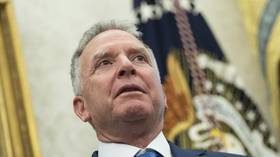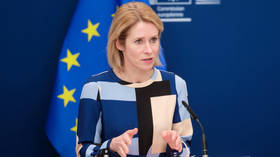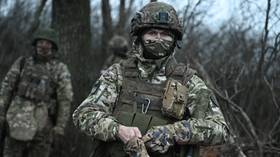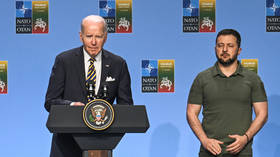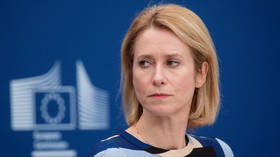..
Russia claims hostile EU report listing ‘factually wrong’ grievances
& demanding more sanctions is attempt at election meddling
This report comes from RT (Russia Today) and may have some inherent bias.
19 Sep, 2021 13:05
© Getty Images / Oleksii Liskonih; (inset) Vladimir Chizhov © Sputnik / Vladimir Astapkovich
A fresh report on EU-Russia relations released by the European Parliament is a futile attempt to influence this weekend's parliamentary elections in the continent's largest country, Moscow’s top envoy to Brussels has alleged.
On Thursday, the bloc's lawmakers approved a document outlining the EU’s relationship with Russia. It was prepared by former Lithuanian PM Andrius Kubilius and passed by a 494 to 103 vote, with 72 MEPs abstaining. It's important to note that setting foreign policy is a function of member states and not parliamentarians in the Belgian capital.
Russia's Permanent Representative to the EU Vladimir Chizhov blasted the report on Sunday, calling it biased, factually wrong and, in his view, aimed at swaying votes in the ongoing parliamentary elections in Russia. If that was the intention, nothing would come out of it, the diplomat predicted, saying that Russian people “are conscious and politically educated enough not to fall for such a move.”
“This entire resolution has this common thread that the government, the president, the parliament are all bad. And there are good democracy-thirsty Russian people, whom the MEPs want to direct toward the light,” he said.
I am certain that many in our country will find this hubris insulting to their intelligence and capacity for independent thinking.
Chizhov believes the adoption of the non-binding resolution was timed to coincide with legislative elections, which Russia is holding this weekend.
The EU report contains a laundry list of grievances it has toward the Russian government, some of which are simply factually untrue, according to the Russian envoy. For example, it states that “the collapse of arms control with Russia (e.g. withdrawals from the Intermediate-Range Nuclear Forces Treaty and the Treaty on Open Skies) and the lack of progress on nuclear disarmament…is of great concern for the security of European citizens.”
Russia indeed abandoned the INF Treaty and the Open Skies treaty, but in both cases the US was the party that initiated the situation. Russia and the US significantly reduced their respective nuclear arsenals under the bilateral New START treaty.
However, that agreement was almost scrapped by former American leader Donald Trump and renewed at the last moment by his successor, Joe Biden. The EU report omits those facts, implying that the collapse was Russia’s fault and part of a wider Russian military buildup threatening other European nations, Chizhov highlights.
This is NATO propaganda as they attempt to convince the west that they still have a purpose.
The MEPs offered a long list of recommendations to the EU and member states on how they should treat Russia, proposing sanctions, the reduction of trade and other measures. Among them was a proposal “not to recognize the Parliament of Russia” after it is sworn in and suspend Moscow from international organizations with parliamentary assemblies, suggesting that the ballot could be “recognized as fraudulent” by the EU. The bloc should also pressure on the country to change its election procedures, the document directed.
The Russian ambassador said such recommendations were clearly directed at meddling in Russia’s domestic affairs. Ironically, the document accused Moscow of conducting hostile political interference in other countries.
For example, RT, together with the Sputnik broadcaster, were accused of promoting the concept of the ‘Russian World’ “in the native languages of the EU Member States” and trying to “rehabilitate Russia’s image in the eyes of the EU population, particularly via the promotion of the Sputnik V vaccine” against Covid-19.
Does this mean the RT and Sputnik should be condemned for not falling in line with the approved narrative of NATO?
Chizhov said he saw a silver lining in the fact that 175 lawmakers refused to support the resolution, indicating that “some MEPs still have reserves of common sense.”

British cops charge third Russian national over dramatic alleged
2018 Salisbury poisoning of spy Skripal & point finger at GRU
21 Sep, 2021 11:54
FILE PHOTO. House of former spy Sergei Skripal, in Salisbury, Britain January 9, 2019.© Reuters / Peter Nicholls
The British police have named a third person they believe had a part to play in the 2018 poisoning of former Russian military intelligence officer Sergei Skripal. London has accused Moscow of being behind an “attempted murder.”
The man, who traveled to the UK on a passport with the name Sergey Fedotov, was charged on Tuesday with conspiracy to murder, attempted murder, causing grievous bodily harm, and the use and possession of a chemical weapon. According to Scotland Yard, the man’s real name is Denis Sergeev.
These are the same accusations leveled at the two previously accused Russian nationals, Alexander Petrov and Ruslan Boshirov. Britain believes their real names to be Alexander Mishkin and Anatoliy Chepiga.
According to London, the three men work for the Russian GRU, the country’s foreign military intelligence agency. In March 2018, they were alleged to have come to the UK to smear a military-grade nerve agent on the handle of former GRU officer Skripal’s front door. The poison – later named by London as ‘Novichok’ – caused Skripal and his daughter to fall ill, also affecting police officer Nick Bailey. Another woman, Dawn Sturgess, allegedly died after spraying it on herself, believing it to be a perfume.
While the British authorities initially blamed just two men, the police now say they have evidence that the three were working as a team and met multiple times over their short trip to the UK.
“All three of them have all previously worked with each other on behalf of the Russian state as part of ops carried on outside Russia,” said Dean Haydon, the Metropolitan police’s deputy assistant commissioner. “All three of them are dangerous individuals.”
The new development is also the first time that the police have explicitly blamed the GRU, three years after former British Prime Minister Theresa May pointed the finger at the organization.
Moscow has consistently denied its involvement in the alleged poisoning, with Foreign Minister Sergey Lavrov insisting that the authorities had nothing to do with it. President Vladimir Putin has also claimed that the suspects fingered by London are simply innocent civilians.
Skripal was arrested in Russia in 2004 and was convicted of passing secrets to MI6, the British foreign intelligence service. The double-agent later confessed and cooperated, before being pardoned and sent to the UK as part of a spy swap for ten Russians convicted as part of the so-called illegals program, including the infamous Anna Chapman.
In 2018, Putin dubbed Skripal a “traitor to his country,” accusing some media outlets of talking about him as if he was a human rights defender.
“He is just scum,” the president said.

UK says it will take all possible steps to extradite Skripal suspects,
as Moscow claims London shifting blame for 'Novichok' case
21 Sep, 2021 15:15
A handout picture taken on Wilton Road in Salisbury, west of London on March 4, 2018, and released by the British Metropolitan Police Service in London on September 5, 2018, shows Alexander Petrov (R) and Ruslan Boshirov. © AFP / Metropolitan Police Service
Speaking in the House of Commons on Tuesday, after prosecutors announced they had charged a third suspect over the 2018 incident, Home Secretary Priti Patel said that the government will be "relentless" in pursuing the trio. "Should any of these individuals ever travel outside Russia we will work with our international partners and take every possible step to detain them and extradite them to face justice," she said.
Earlier that day, police said they wanted to bring a case against a man who travelled to the UK under the name Sergey Fedotov for conspiracy to murder, attempted murder, causing grievous bodily harm, and the use and possession of a chemical weapon. Fedotov had been added to the wanted list in addition to two other Russian nationals, known as Alexander Petrov and Ruslan Boshirov, who investigators claim are military intelligence agents who were sent to kill Skripal.
In March 2018, the city of Salisbury, around 80 miles southeast of London, went into lockdown after reports that a deadly Soviet-era nerve agent, Novichok, had been smeared on the handle of Skripal's front door. A former member of Russian military intelligence, he served as a double agent for the UK's intelligence services during the 1990s and 2000s, before moving to Britain in 2010 under a spy swap deal. He and his daughter, Yulia, were found on a park bench having been taken ill, and were admitted to hospital.
Police officer Nick Bailey, who was sent to investigate the Skripals' house, was also hospitalized. Another woman, Dawn Sturgess, later died after reportedly finding a perfume bottle containing the supposed nerve agent and spraying it on herself.
Russia has consistently rejected allegations that there was a state-sponsored effort to kill the Skripals. Responding to the news later on Tuesday, Foreign Ministry Spokeswoman Maria Zakharova said that "it has been a long time since we dealt with this subject, and I'm not sure why it is resurfacing now," suggesting the allegations are part of a wider geopolitical play.
"For more than two years now, the British authorities have been using the Salisbury incident to deliberately complicate our bilateral relations," she said. "We strongly condemn all attempts by London to blame Moscow for what happened in Salisbury and insist on a professional, objective and impartial investigation of the incident."
"Despite numerous requests from the Russian side and appeals for a responsible joint investigation, London continues to refuse proper discussions or a shared inquiry into this incident, as a result of which, I recall, Russian citizens have suffered," Zakharova added.
The UK's foreign policy chiefs summoned the Minister-Counselor of the Russian Embassy to a meeting on Tuesday in order to discuss the charges against the three Russian men. In comments after the meeting, Moscow's envoys said that it was entirely unfounded to assess that a Russian citizen was involved in the case because of when they entered the UK.

Kremlin says ECHR's claim Russia behind Litvinenko poisoning
'unfounded,' arguing court has no evidence of Moscow's involvement
21 Sep, 2021 10:41
The building of the European Court of Human Rights. © Reuters / VINCENT KESSLER;
(inset) press secretary of the President of the Russian Federation Dmitry Peskov. © RIA / Sergey Guneev
Speaking to journalists after the court gave its verdict on Tuesday, Kremlin Press Secretary Dmitry Peskov said that justices had no substantive evidence to back up the allegations that the Russian state was involved in Litvinenko’s death.
“It is unlikely that the ECHR has the powers or technological capabilities to have information on this matter,” he said. “There are still no results from this investigation,” Peskov added, “therefore it is at least unfounded to make such statements.”
The judgement, passed down by justices earlier on Tuesday, argued that “Russia was responsible for the assassination of Litvinenko in the UK.”
The former security agent died in a London hospital in 2006 after what British investigators concluded was poisoning with a rare radioactive isotope, Polonium-210. They claim that the substance was slipped into his drink during a meeting at a nearby hotel, and insist that the Russian state had ordered the killing.
Litvinenko defected to the UK in 2000, having previously worked as a high-ranking officer in Russia’s FSB, running agents in war-torn Chechnya during its bloody conflict in the early 1990s. He was later recruited by Britain’s MI6 spy agency, officials said, to provide “useful information about senior Kremlin figures and their links with Russian organized crime.” A Moscow court found him guilty of corruption in absentia and sentenced him to three-and-a-half years in jail.
In the ruling, the ECHR alleges that two Russian citizens, Andrey Lugovoy and Dmitry Kovtun, were behind his death, and acting on orders from above. “The Court found in particular that there was a strong prima facie case that, in poisoning Mr Litvinenko, Mr Lugovoy and Mr Kovtun had been acting as agents of the Russian state,” the statement from the court reads.
Russia has consistently denied any involvement, and Lugovoy told reporters in Moscow the year after the incident that “Britain is making me a scapegoat.”
